Day 01 – ArriveDelhi
Your Heritage of India and Nepal Tour begins with your
arrival at the Delhi International Airport. At the airport, you will be
received by a The India Tourism representative and he will escort you to the
hotel and help you with the check in formalities.
Delhi, Heritage Tour of India and Nepal The tour starts
from the capital city, Delhi, an active city, with an ideal combination of the
ancient and the contemporary era. Delhi has two visible parts: New Delhi, the
city created by the British, as the royal capital of India in 1911. The Old
Delhi which was considered as the Muslim capital of India between the 17th and
the 19th century. There are at least eight cities on the location of modern
Delhi among which Indraprastha is one of the first recognized settlements,
highlighted in the epic Mahabharata over 3000 years ago. Nevertheless, Delhi
has always been one of the major cities in the northern region of the
subcontinent. Overnight in Delhi.
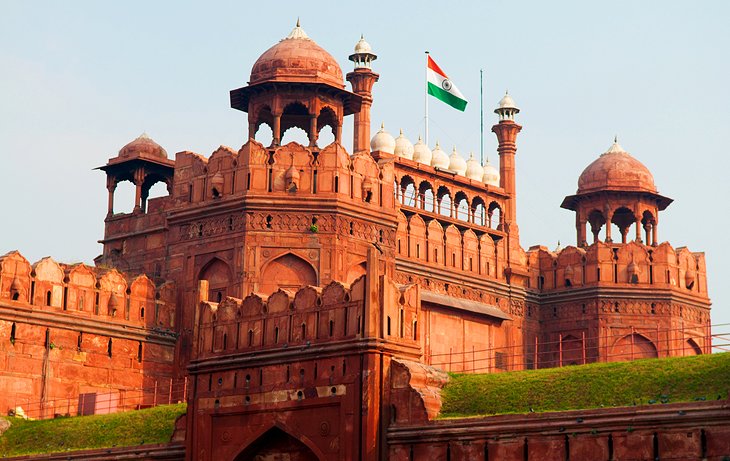
Day 02 – In Delhi
After a relaxing breakfast, the tour guide will pick you
up from the hotel and take you for a guided sightseeing of Old and New Delhi.
This tour includes the following places:
Red Fort: The term Red Fort is taken from a Hindi word
Lal, which means red and Quila which means fort. The structure of the Red Fort
is very uneven and it is placed in an octet shape along the Yamuna River. This
fort is delimited by a wall of about 2.4 kms in perimeter and is constructed of
red sandstone. In 1638, Shah Jahan started building this huge fort and it was
completed in 1648. The fort has a Diwan-e-Am (Hall for public audience), a Rang
Mahal (a water- cooled apartment of royal ladies) and a Pearl Mosque, which was
constructed with white marble. Red fort has two hallways: a) The Delhi gate and
b) The Lahori gate, and both this gates face the renowned Chandni Chowk.
Jama Masjid, Heritage Tour of India and NepalJama Masjid
: Jama Masjid is one of the country’s major mosques where hundreds and
thousands of Muslims offer their prayers even today. Jama Masjid was
constructed by Shah Jahan as an architectural extravaganza in 1658. The wonders
of construction in Jama Masjid are seen in the long stretches of stairs and the
hefty courtyard. Overnight in Delhi.
Day 03 – DriveDelhi – Jaipur (265 kms/05 hrs)
After breakfast at the hotel, you will be met by our
representative and he will assist you with the check-out formalities. You will
then start your drive to Jaipur, the next destination on your India and Nepal
Tour.
Jaipur : It is the capital of Rajasthan, and is known as
the “Pink City” because of the pink tinted constructions in the old city. It is
situated on a dry lake bed, bordered by barren hills vanquished by forts and
broken walls. The city was found in 1727 by Maharaja Jai Singh II, who wanted
to be in the good books of the then ruling Mughals. He positioned the city with
rectangular blocks according to early Hindu architecture. It is a great city
for shopping.
On your arrival at the hotel in Jaipur, you will be met
by our representative and he will assist you with the check in formalities. Overnight
in Jaipur.

Day 04 – In Jaipur
Hawa Mahal, Heritage Tour of India and Nepal After a
relaxing breakfast, you will be picked up by the guide from the hotel and will
be taken for a guided sightseeing tour of Jaipur and Amber.
Hawa Mahal (Palace of winds) : Constructed by Maharaja
Sawaj Pratap Singh in 1799, the Hawa Mahal is one of the Jaipur’s main
landmarks; the front of the Mahal has pink windows and latticework screens.
This Mahal was initially constructed for the ladies of the imperial household
to watch the ordinary life and parades of the city.
City Palace : The City Palace is still the dwelling of
the former royalty H.H Bhawani Singh Ji of Jaipur. This Palace still has an
extensive collection of art, carpets and old weapons.
Jantar Mantar (Observatory) : It was built by Maharaja
Jai Singh in 1728. Jantar Mantar appears to be an inquisitive collection of
sculptures but in fact each construction has a detailed purpose such as
measuring the positions of stars, altitudes and azimuths, and calculating
eclipses. The most striking instrument is the sundial which is 27 meter tall
gnomon. The shadow this casts moves up to 4 meters an hour. Amber Fort: The Amber Fort is located 11 kms away from
Jaipur. Amber was once the ancient capital of Jaipur. The Fort is an excellent
illustration of Rajput architecture, impressively situated on a hillside facing
a lake, which reflects its walkways and walls. Overnight in Jaipur
Day 05 – DriveJaipur – Agra (250 kms/05 hrs)
After breakfast at the hotel, you will be met by our
representative and will be assisted with check-out formalities. You will then
start your trip to Agra, your next destination on the India and Nepal Tour,
enroute stopping at Fatehpur Sikri, for a guided tour of this ancient capital.
Fatehpur Sikri: The deserted capital of Emperor Akbar
roughly 35 kms outside Agra, this city was built in the 16th century, and was
abandoned for 12 years due to the paucity of water. The entire city is still
intact, and a sight of this city is worth remembering. The Buland Darwaza,is
the main entrance to this city, which is 54 m tall and this gate was built in
the honor of Akbar’s victory in Gujarat
After visiting Fatehpur Sikri, continue your drive to
Agra, the next stop on your India and Nepal Tour.
Agra is situated on the bank of Yamuna River. It is the
dwelling place to India’s famous monument, the Taj Mahal. Agra was the capital
of Mughal Empire in the 16th & 17th centuries. Overnight in Agra.
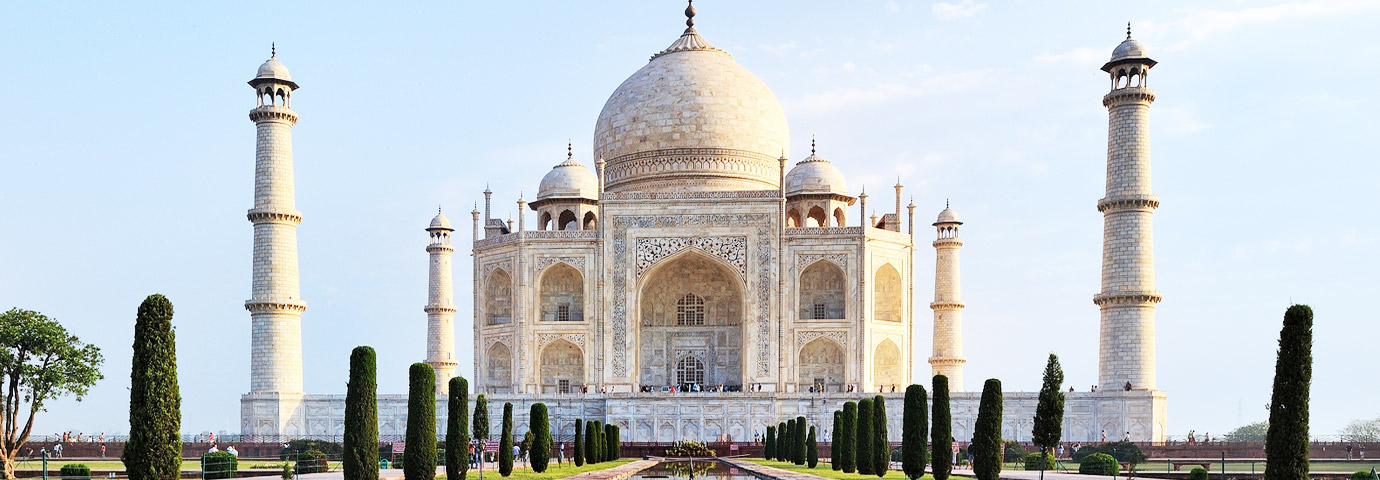
Day 06 – DriveAgra – Gwalior (120 kms/03 hrs)
After a leisurely breakfast, you will be met by our
representative and he will assist you with the check-out formalities. You will
then start your drive to Gwalior, the next destination on your India and Nepal
Tour.
Gwalior – Gwalior is located in the state of MadhyaPradesh. It is the city of true royals, the Scindias. Gwalior is famous for its
magnificent Forts and is considered as one of the best in the world. This grand
Fort that dictates this dry and dusty city has witnessed the rise and fall of
many dynasties which have had power over the centuries. The main palace, Man
Mandir, still displays the elaborate carvings and the art form from the 9th
century. And the prison underneath the palace gives a realistic image of the
Mogul prisoners’ fate. This Fort has been defined by Babur as ‘the pearl among
the fortresses of Hind’.
Upon arrival in Gwalior, check in at the hotel.
Afternoon, guided sightseeing tour of Gwalior visiting the Gwalior Fort,
Museum, Rani Laxmibai Memorial and Tansen’s Tomb. Overnight in Gwalior.

Day 07 – DriveGwalior – Orchha (120 kms/03 hrs)
After a relaxing breakfast at the hotel, you will start
your drive to Orchha, the next destination on your India and Nepal Tour.
Orchha - Orchha is a small town far away from the madding
crowd of the city. It is in the Central part of India, once the capital of the
Bundela rulers. This small town is set amid the well-preserved temples and
palaces, which dates back to 16th century. Most of the temples are still
regularly visited by hundreds and thousands of devotees to worship at the
shrine of Rama. Though little-known, Orchha is a place worth visiting for its
serene beauty. Little shrines and memorials are spotted all over Orchha, each
of them with their own history.
On arrival in Orchha, check in at the Orchha Resort.
Afternoon, guided sightseeing tour of Orchha. The tour of Orchha takes you to
the Jehangir Mahal, the largest of the palaces, the Raj Mahal with its murals
and the Raj Praveen Mahal constructed near the garden. The Chatur bhuj temple
and the Royal Chattris are by the Betwa River. Overnight stay at the Orchha
Resort.
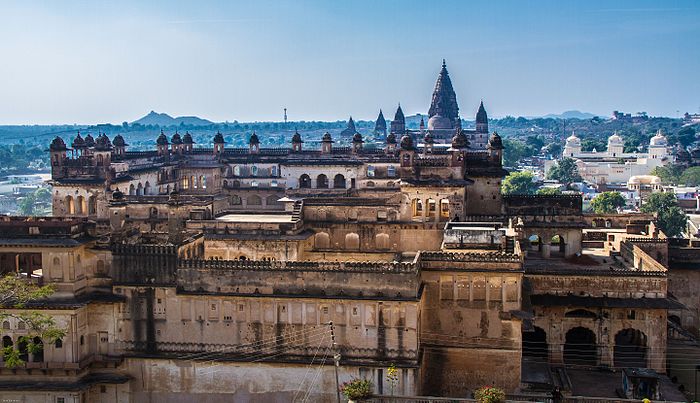
Day 08 - DriveOrchha – Khajuraho (180 kms/04 hrs)
Khajuraho, Heritage Tour of India and Nepal After a
relaxing breakfast, you will start your drive to Khajuraho, the next destination
on your India and Nepal Tour.
Khajuraho : Khajuraho was once the capital of the
Chandela Rajputs of Bundelkhand. It is the dwelling place of the World’s famous
10th century Khajuraho Temples. These temple have attractive and erotic rock
carvings, these carvings symbolizes some of the beautiful specimens of the
medieval Hindu architecture and sculpture in the country.
On your arrival at the hotel in Khajuraho, you will be
met by our representative and he will assist you with the check in formalities.
Afternoon, you will be picked up from your hotel and will be taken for a guided
sightseeing tour of Khajuraho. Tour includes visits to the following places of
interest: Eastern & Western Group of Temples : The Eastern group of temples
includes the Lakshmi and the Varaha Temple, the Lakshmana Temple, theKandariya Mahadev, the Mahadeva Temple, the Devi Jagadamba Temple, the
Chitragupta Temple and the Vishwanath Temple. The Eastern Group of temples
houses the Parasvanath Temple, the largest and finest Jain temple in the city
as well as the Adinath Temple, the Shantinath Temple, the Ghantai Temple, the
Javari Temple, the Vamana Temple and the Brahma and Hanuman Temple. The Western
group of temples includes the Matangesvara Temple, the only temple in Khajuraho
where the daily rituals still takes place and the Chausath Yogini Temple, the
temple which is in ruins now and is believed to be the oldest temple in
Khajuraho.
Overnight in Khajuraho.
.jpg.jpg?1536216782)
Day 09 – FlyKhajuraho – Varanasi
After breakfast at the hotel, you will be met by our
representative at hotel and he will assist you with the check out formalities.
You will then be escorted to the airport in time to board flight for Varanasi,
the next destination on your India and Nepal Tour.
Varanasi, Heritage Tour of India and Nepal Varanasi -Varanasi the ‘eternal city’ is one of the major pilgrimage spots in India.
Varanasi is located on the banks of the sacred river Ganges. Over 2000 years
Varanasi has been a center of learning. Apart from being a pilgrimage spot in
India, Varanasi is also considered as an auspicious place to die, establishing
an instant route to heaven. Varanasi is a special place for the Sanskrit
scholars and students from all over India are seen here. The ancient city of
Varanasi is located along the West bank of the river Ganges. This city extends
back from the riverbank ghats in a twisted collection of passageways. These
passageways are too cramped for anything but walking. The city extends from Raj
Ghat, near the bridge to AsiGhat near the University.
You will again be met by our representative at the
Varanasi Airport and he will escort you to the hotel and help you with the
check in formalities. Overnight in Varanasi.
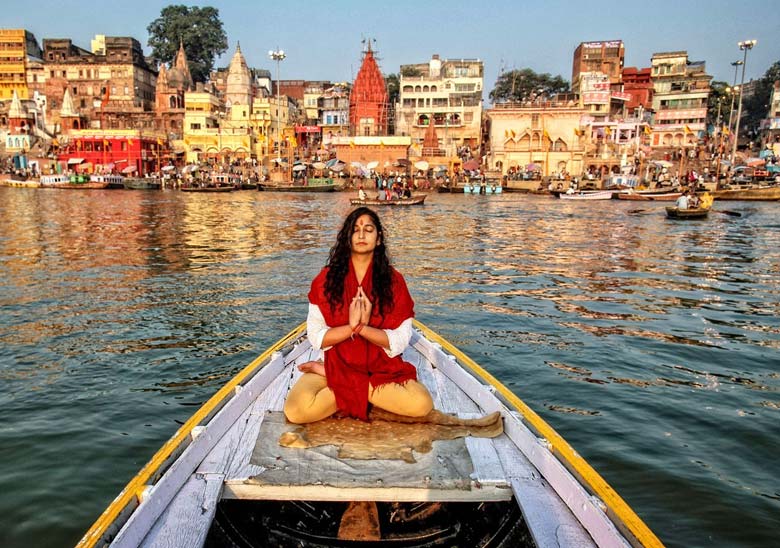
Day 10 – FlyVaranasi – Kathmandu
Kathmandu, Heritage Tour of India and Nepal The day begins
early with a Dawn Boat Ride on the holy river Ganges. The guide will pick you
up from your hotel and will take you to the river Ganges. The City and the
river Ganges come alive at dawn, when hundreds and thousands of devotees come
to the river to worship the Sun God. The edge of the river looks amazing from a
boat at sunrise and this sight is spiritually uplifting. Hinduism is deep and
magical, it is everywhere; in the sight of a sparkling temple; in the sound of
a sacred bell; in the prayer chants of the priests and in the smell of the
flowers.
Return to hotel for a relaxing breakfast. Later, you will
be met by our representative and he will assist you with the check-out
formalities. You will then be escorted to the airport in time to board flight
for Kathmandu, the final stop at your India and Nepal tour.
Kathmandu : The small kingdom of Nepal is a country full
of diversity and charm, protected between India and Tibet. Kathmandu is a
secret kingdom of great allure enveloping eight highest mountains out of the
world’s ten highest mountains. The view is breathtaking from the highest point
on Earth (Mount Everest) to the fertile jungle lowland. People here are mostly
Hindu but a small population of Buddhism is also seen here and this lively
combination of religion and culture portrays the beauty of Nepal, and
specifically its capital Kathmandu. The artistic and architectural traditions
resemble a lot of things found in the great cities ofEurope. Beyond the temples
and bustle of the towns of the Kathmandu Valley rise the mountains of the Nepal
Himalaya - the 'Abode of Snows'.
After clearing Customs and Immigration, you will be met
at the airport by a The India Tourism representative and he will escort you to
the hotel and will assist you with the check in formalities. Overnight stay in
Kathmandu.

Day 11 –InKathmandu
Kathmandu, Holidays Tour of India and Nepal After a
relaxing breakfast, you will be picked up from your hotel and will be taken for
a guided sightseeing tour of Kathmandu.
Pashupatinath - Pashupatinath is in the eastern part of
Kathmandu. It is one of the major Hindu temples of Lord Shiva in the world and
one of the famous pilgrimage spots in Nepal. In the complex there are statues,
shrines and temples devoted to other deities along with the Linga image of Lord
Shiva. Gold-plated ceiling, silver doors and the woodcarvings of the best
quality beautify the Pagoda architecture.
Bodhnath - Bodnath is one of the blessed Buddhist spots
in Kathmandu. The Bodnath stupa is one of the largest stupa in the world. The
stupa rhythms with life as hundreds and thousands of devotees meet daily spin
the prayer wheel, chant and perform a ritual ‘Parikrama’ of the Boudha stupa.
The stupa is situated on the ancient trade route to Tibet, and the Tibetan
traders would rest and pray here. Today most of the Tibetans living in
Bouddhnath are the refugees who fled from Tibet and entered Nepal in 1950.
These Tibetans who migrated to Nepal established many gompas and the “Little
Tibet” of Nepal was born.
Bhadgaon - The third largest medieval city in the
Kathmandu valley, Bhadgaon also known as the Bhaktapur is well preserved.
Bhadgaon was the capital of Nepal during the Malla Kingdom from the 12th and
the 15th century. Overnight in Kathmandu.
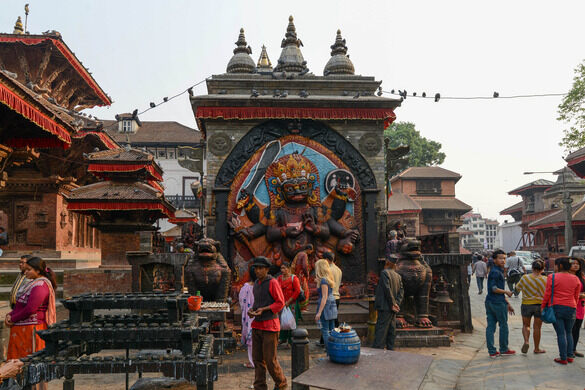
Day 12 – In Kathmandu
After a relaxing breakfast, you will be picked up from
your hotel and will be taken for a guided sight seeing tour of Kathmandu.
Kathmandu Durbar Square - Kathmandu Durbar Square is a
number of interesting pagodas and Indian style temples (Sikhara), the House of
Kumari (the living Goddess) and the Kasthamandap (or wooden house which is the
origin of the word Kathmandu) and many more things to see.
Sawayambhunath - Sawayambhunath is one of the definite
experiences of Kathmandu. It is a unique combination of the Buddhist and the
Hindu religion. Visiting Sawayambhunath is a mind-altering experience, with age
old carvings and the smell of the incense and lamps in the air. The magical
atmosphere is finally tuned through out the day by the local devotees who make
a ritual ‘Parikrama’ of the stupas, by chanting and spinning the prayer wheels.
Hanuman Dhoka – Hanuman Dhoka is a temple compound in the
heart of the old city. The Hanuman Dhoka was constructed during the Malla
period. There are a number of different monuments and images of Lord Hanumana. Overnight in Kathmandu.
Day 13 – DepartKathmandu
After leisurely breakfast at the hotel, you will be met
by our representative and he will assist you with the check-out formalities.
You will then be escorted to the airport in time for your flight back home.
No comments:
Post a Comment